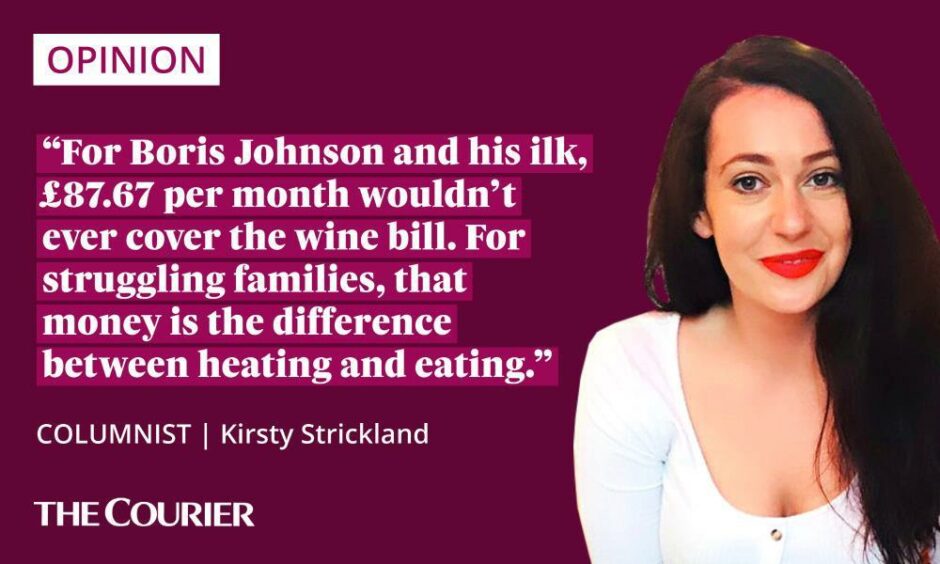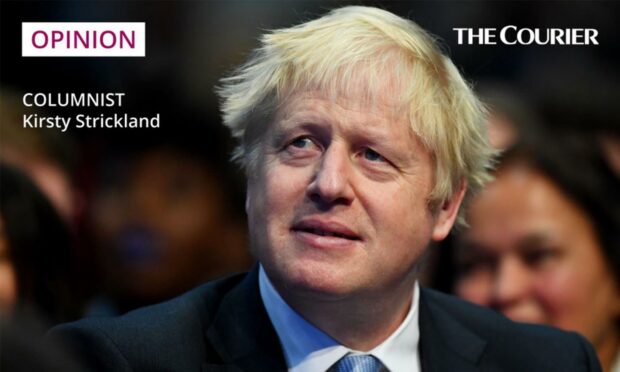This week, Boris Johnson will take centre stage at the Conservative Party conference for his leaders’ speech. On the same day he will walk to the podium to the cheers of his colleagues and admirers, the £20 uplift to Universal Credit will formally come to an end.
The UK government insist this isn’t a cut.
They say the increase was only ever meant to be temporary. And returning to pre-pandemic levels of Universal Credit is the fiscally responsible thing to do.
What a load of nonsense.
Politics is all about priorities.
Your priorities stem from the vision you have for the country.

It starts as bucket-list stuff: what does your ideal world look like? How does society function? How is wealth created and distributed?
Then, those big ideas make contact with reality and are whittled down into individual, costed, policies.
The nitty-gritty details are never as sexy as the overarching vision, but they are what help turn it into a reality.
From the left to the right, all politicians claim that they went into the job to make people’s lives better.
Boris favours slogans over hard graft
The Conservatives have attempted in recent years to shake off their “nasty party’’ image.
But they are proving how hollow that soundbite is with this cruel decision to take away the £20 lifeline.
But then, Boris Johnson certainly has form for preferring slogans over the hard graft of politics.
During the EU referendum, he sold us “Take Back Control’’.
Now he has control, it’s all “Build Back Better’’ and “Levelling-up’’.
We are the party of opportunity.#BuildBackBetter pic.twitter.com/TVJ8PAuSTc
— Boris Johnson (@BorisJohnson) October 4, 2021
When he takes to the stage on Wednesday, he will deploy both and his audience will lap it up.
Before the words have even left his lips, they will have been rendered meaningless.
You can’t “Build Back Better’’ on the backs of the poor.
You can’t level-up a country while condemning families to poverty.
Boris Johnson and his colleagues have abandoned their responsibilities by deciding the well-being and dignity of those on low incomes isn’t a priority
For Boris Johnson and his ilk, £87.67 per month wouldn’t ever cover the wine bill.
For struggling families, that money is the difference between heating and eating.
That point has been made many times in recent months, but it’s not just a flowery turn of phrase.
It’s a lived reality for many people and those who have never had to make that choice should be sickened that others have.
There is something grotesque about our slick, media-savvy Chancellor taking away this lifeline with a stroke of his pen, while himself living with the kind of riches few could dream of.
Maybe to men like him and Boris Johnson, £20 a week doesn’t seem that big a deal.
But if they understood why it was necessary to increase Universal Credit in the first place, they should also understand the devastating impact that removing it will have.
They are cutting Universal Credit in a crisis
Of course, the UK Government says that everything is back to normal now.
That this was a pandemic cash-boost, like the furlough scheme, which we don’t need anymore.
That doesn’t wash.
The UK government is currently presiding over a cost of living crisis.
Energy prices are going up. Food and fuel prices are going up. Winter is just around the corner and people are already struggling to afford the basics.
The Resolution Foundation described the end of the £20 a week uplift as the biggest ever overnight cut to benefits and warned it could shape the living standards of millions of people for years to come.
The Joseph Rowntree Foundation said the Prime Minister was ‘’abandoning millions to hunger and hardship with his eyes wide open’’.
Today we have come together in a joint open letter to @BorisJohnson as part of a 100-strong coalition to urge the Government not to cut #UniversalCredit by £20 a week and to #KeepTheLifeline 🧵 pic.twitter.com/fIs8CyUo4u
— Joseph Rowntree Foundation (@jrf_uk) September 2, 2021
The move has been opposed by many, including six former work and pensions secretaries and anti-poverty charities.
In a joint letter to the prime minister, the first ministers of Scotland, Wales and Northern Ireland said there was ‘’no rationale for cutting such crucial support at a point when people across the UK are facing an unprecedented squeeze on their household budgets.’’
“This cut threatens to undermine the recovery by diminishing the capacity of six million people to make ends meet,” they say.
“It is not too late for you to reverse the decision to take money out of the pockets of the poorest in society at a time when they are facing a serious cost of living crisis.”
Children condemned to poverty
Academic modelling on the impact of the Universal Credit cut suggests it will result in an “explosion’’ of child poverty.
One study predicted an additional 1,500 children would be taken into care and thousands more families would be classed as “in need’’ by social services.
Yet despite the overwhelming evidence of the devastation this decision will bring, the UK government shows no sign of budging.
Politics is all about priorities.
Boris Johnson and his colleagues have abandoned their responsibilities by deciding the well-being and dignity of those on low incomes isn’t a priority.
Shame on them.
